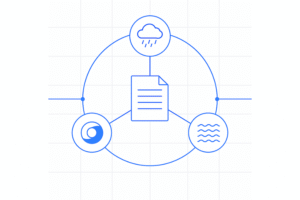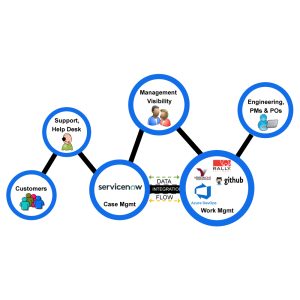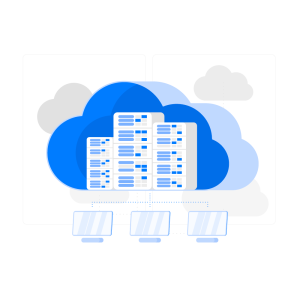Artificial Intelligence (AI) is reshaping industries at an unprecedented pace. From predictive analytics to customer personalization, businesses are racing to adopt AI for competitive advantage. But the question remains: What’s the best way to adopt AI through open source frameworks or enterprise-grade platforms like IBM Watson?
Open source AI provides flexibility, cost-effectiveness, and access to a vibrant community of developers. At the same time, IBM Watson Studio and IBM AI models offer enterprises a ready-to-deploy ecosystem, backed by governance, scalability, and security.
This blog explores both approaches in depth examining their benefits, trade-offs, and industry use cases so you can make an informed decision for your business.
What is Open Source AI?
Open source AI refers to machine learning and deep learning frameworks, libraries, and tools that are freely available for public use. Examples include TensorFlow, PyTorch, Hugging Face Transformers, and Scikit-learn.
Key Benefits of Open Source AI:
- Flexibility and Control: Developers can customize models, modify algorithms, and tailor solutions to highly specific use cases.
- Community Support: Thousands of contributors provide updates, bug fixes, and pre-trained models, accelerating innovation.
- Cost Efficiency: With no upfront licensing fees, businesses can experiment with minimal investment.
- Rapid Innovation: Cutting-edge research often appears in open source before it reaches commercial platforms.
Limitations of Open Source AI:
- Complex Implementation: Requires skilled data scientists, DevOps engineers, and ML specialists to deploy at scale.
- Security and Governance Gaps: Few built-in tools for data privacy, model explainability, or regulatory compliance.
- Scalability Challenges: Moving from prototype to enterprise-grade deployment can be costly and time-intensive.
- Hidden Costs: While “free,” open source projects often require significant investment in infrastructure, staff, and ongoing support.
What is IBM Watson?
IBM Watson is a comprehensive suite of enterprise-ready AI tools and services designed to help organizations build, train, deploy, and scale artificial intelligence securely and efficiently. Unlike open source AI, which often requires heavy customization and infrastructure management, IBM Watson provides a structured ecosystem with pre-built capabilities tailored for real-world business needs.
The Watson portfolio includes Watson Studio, a platform where data scientists and business analysts can collaboratively design and train models; Watson Discovery, which transforms unstructured data into actionable insights; Watson Assistant, a conversational AI solution for building intelligent virtual agents; and pre-trained IBM AI models optimized for industries such as finance, healthcare, and retail.
Why Enterprises Choose IBM Watson:
- Enterprise-Grade Governance: Built-in compliance with GDPR, HIPAA, and financial regulations ensures that AI models remain trustworthy and auditable.
- Scalability: Deployed via IBM Cloud Pak, Watson supports hybrid and multi-cloud environments for global scalability.
- Pre-Built Models: Industry-specific AI reduces development time and accelerates ROI by addressing common business challenges directly.
- Business Analytics Integration: Watson ties into IBM business analytics tools, enabling smarter, automated decision-making.
- Security & Transparency: Advanced encryption, role-based access, and explainable outputs build trust across stakeholders.
Together, these features make IBM Watson a strong choice for enterprises seeking both innovation and compliance.
Open Source AI vs IBM Watson: A Feature Comparison
| Feature | Open Source AI | IBM Watson Studio & AI Models |
| Cost | Free to use, hidden infra/staff costs | Licensing/subscription, but includes enterprise support |
| Scalability | Complex, requires DevOps & cloud management | Enterprise-ready with IBM Cloud Pak integration |
| Governance | Minimal | Robust compliance, explainability, and audit trails |
| Flexibility | Highly customizable | Customizable but guided by IBM’s structured ecosystem |
| Support | Community-driven | Dedicated IBM enterprise support |
| Use Cases | Startups, research, small-scale apps | Enterprises, regulated industries, mission-critical |
Use Cases for Open Source AI
- Startups: Many startups, especially in fintech, adopt Watson AI open source libraries such as NLP frameworks to build low-cost prototypes. This allows them to validate ideas quickly without major upfront investment.
- Academic Research: Universities and research institutes rely heavily on open source AI for testing deep learning models, developing algorithms, and publishing new innovations, thanks to accessible frameworks like TensorFlow and PyTorch.
- Niche Solutions: Developers working on highly specific industry challenges often prefer open source AI since it allows full customization, flexibility, and freedom from vendor lock-in.
Use Cases for IBM Watson
- Finance: Banks use Watson Studio models for automated credit scoring and real-time fraud detection, improving accuracy and compliance.
- Healthcare: Providers leverage Watson AI for medical image analysis, patient engagement, and tailoring treatment plans for better outcomes.
- Retail: Retailers deploy AI to deliver hyper-personalized recommendations, optimize supply chains, and monitor customer sentiment.
- Manufacturing: Factories use IBM Cloud Pak with Watson Studio for predictive maintenance, ensuring equipment reliability, quality control, and efficient production planning.
Watson drives automation and smarter decisions across diverse, high-impact industries.
Which Businesses Should Choose Open Source AI?
- Cost-Conscious Startups: Early-stage companies often operate with limited budgets. Watson AI open source frameworks like TensorFlow or PyTorch allow them to test ideas quickly without heavy licensing costs, making experimentation affordable and accessible.
- Organizations with Strong Tech Teams: Enterprises that already have skilled data scientists, ML engineers, and DevOps support can fully leverage the flexibility of open source AI. With the right expertise, they can customize models extensively and manage the added complexity of scaling.
- Non-Regulated Industries: Businesses outside highly regulated sectors such as entertainment, retail startups, or digital marketing may not require strict governance. For them, open source AI provides innovation freedom without the burden of compliance-heavy platforms.
- Prototyping and R&D Teams: Open source AI is perfect for building minimum viable products (MVPs) or testing proof-of-concepts. Teams can rapidly experiment, validate models, and then decide whether to move into enterprise-grade environments like IBM Watson Studio for deployment.
Which Businesses Should Choose IBM Watson?
- Enterprises in Regulated Sectors: Organizations in banking, healthcare, insurance, or government face strict regulatory standards like GDPR, HIPAA, or Basel III. IBM Watson Studio and IBM AI models provide governance, audit trails, and explainable outputs that ensure compliance while delivering automation at scale.
- Companies Scaling Globally: For multinational businesses, IBM Cloud Pak offers hybrid and multi-cloud flexibility. This allows AI models to be deployed consistently across regions, maintaining performance and compliance with local data laws.
- Businesses with Limited In-House AI Teams: Not every company has a large team of data scientists. With Watson’s pre-trained AI models and automation features, even organizations with limited AI expertise can implement solutions quickly and achieve ROI faster.
- Organizations Seeking Explainable AI: Transparency is crucial in finance, healthcare, and legal industries. Watson ensures that every AI decision is explainable, trustworthy, and auditable, fostering confidence among regulators, employees, and customers.
The Hybrid Approach: Best of Both Worlds
For many organizations, the decision between Watson AI open source and IBM Watson Studio isn’t binary. A hybrid strategy can deliver the best of both worlds. Teams often start by experimenting with open source frameworks such as TensorFlow or PyTorch, taking advantage of their flexibility, rapid prototyping, and community-driven innovations. This allows developers to test ideas quickly without heavy investment.
Once models show value, they can be transitioned into IBM Watson Studio for enterprise-grade deployment. Here, they benefit from IBM Cloud Pak, which provides scalability, governance, and security capabilities most open source tools lack. This hybrid model allows organizations to innovate at startup speed while ensuring compliance with regulations like GDPR and HIPAA.
By blending agility with structure, businesses can experiment freely while still delivering trusted, auditable AI solutions. It’s a practical way to bridge innovation with operational excellence, especially for enterprises scaling AI across industries.
Future Outlook: AI in 2025 and Beyond
The future of AI is not just about adoption it’s about scaling responsibly. By 2025, enterprises will demand explainable AI at scale, ensuring every model can justify its outputs for compliance and trust. Automated decision making will expand beyond isolated use cases, powering end-to-end workflows across finance, healthcare, retail, and manufacturing.
At the same time, hybrid and multi-cloud AI deployments will become standard, allowing businesses to balance performance, security, and regulatory requirements across geographies. Integration with IBM business analytics will ensure that AI is not just a technical tool but a driver of measurable ROI through predictive insights, real-time dashboards, and scenario planning.
In this landscape, IBM Watson Studio and IBM AI models stand out as enterprise-ready solutions, while Watson AI open source frameworks will continue to fuel innovation and experimentation. Together, they define the dual path of agility and governance shaping AI’s future.
Final Verdict: Which is Right for You?
Deciding between open source AI and IBM Watson is not a one-size-fits-all choice it depends on your organization’s size, priorities, and long-term vision. For startups, academic institutions, and agile innovation teams, open source AI provides a powerful foundation. With tools like TensorFlow, PyTorch, or Hugging Face, teams can experiment quickly, customize models to fit niche problems, and leverage community-driven updates. However, this path requires skilled developers, robust infrastructure, and the ability to manage governance, scalability, and compliance internally. For many smaller organizations, these hidden costs can outweigh the initial “free” appeal.
In contrast, enterprises in finance, healthcare, retail, or manufacturing often find more value in IBM Watson Studio and IBM AI models. By combining automation with enterprise-grade governance, Watson ensures AI-driven decisions are not only fast but also explainable, secure, and compliant with regulations like GDPR and HIPAA. With IBM Cloud Pak, businesses can scale AI across hybrid and multi-cloud environments without compromising performance or trust.
For some, the best approach is hybrid: leverage Watson AI open source frameworks for experimentation and transition to IBM Watson for enterprise deployment. Ultimately, the right choice is the one that aligns with your business strategy, balancing innovation with scalability and governance.




